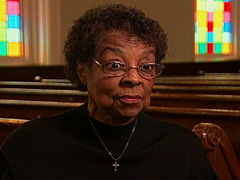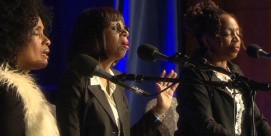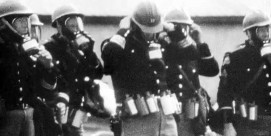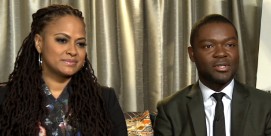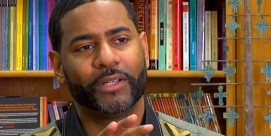In This Episode << SLIDE LEFT TO SEE ADDITIONAL SEGMENTS
Reverend Mary Jo Smiley
Read more of Kim Lawton’s interview about Martin Luther King Jr. with the Reverend Mary Jo Smiley:
A friend brought me to visit Dexter [Avenue Baptist Church]. I had visited other churches but just found something at Dexter that drew me back. I had been fortunate enough to be in the presence of, I feel, not only great orators but great ministers. You know, there’s a difference. People may not sometimes realize, but there’s a difference between a preacher [and] a minister. I found everything I wanted at Dexter. I was here in the presence of Dr. Murray Branch, I was here for at least five well-known, well-versed, very capable ministers at Dexter. Dexter had a reputation of not having a minister [or] pastors here too long, and I keep telling my present pastor he’ll be here a while.
[Dr. King] came a few years after I had joined Dexter. He didn’t come to Montgomery to lead a boycott; he came to be a pastor for our Dexter Avenue Baptist Church. And as fate would have it, he was drawn into what was happening in Montgomery. But as a pastor, he not only filled the bill, he went above and beyond his call. For instance, Dexter was, for the past, a church of men, well-dressed women, socially elite so-called African Americans. You wore your hats and your gloves to church, the children were seen but not heard, and the women took care of the church in keeping it clean and whatnot. ML would come to the house sometimes just to relax and play ping-pong with my husband. I don’t know why he kept coming, because he never won a game, but he did. In the church he would engage the women to help him, not just to dust off the pews or keep the utensils clean, but he would engage them in helping make plans for the church, programs and whatnot. He established what we call “month clubs” at Dexter. And each month club had a certain purpose to help in the church procedures and programming and whatnot, and to build up — and you will find that most of them were headed by women, and so it gave women a purpose, a feeling of closeness and a feeling of being wanted in the church, which wasn’t too much so before. ML took time to let the children know he was there for them. He didn’t just look at them, speak to them, and keep going; he would take time with them to converse with them, to cajole them, to let them know that this was their second home. And I must say, of all the excellent pastors we’ve had, ML had a control of words that, along with his charisma — he was able to not only talk, speak, guide, whatnot, but he was able to make the lowest of the low, the smallest of the small, to understand. And that was something that was a little different at Dexter. We understood those former ministers, but ML made you feel he was speaking directly to you and that, in turn, made the congregation feel a real part of the church. He was not only awakening, I would say, Dexter, but he was a part of his community where he lived. He did not just go into his house and close the doors. He knew his neighbors, and he associated with them, and he was there for them.
Frankly speaking, I was mesmerized by ML. I loved to hear him talk, and I hung on almost every word. I think I’m today what I am because of two people: ML and my mother. I felt something from him to me that said, “You’re needed in the church, too.” I never thought about being an instrument in the church. Being a part of the church, yes, but not being an instrument to help the church along, to be a part of the congregation that would do things for the church, and to be evangelistic in ways and whatnot. But he instilled in me a desire to do some of the things that he spoke about.
ML was one of the great experiences — knowing him and his family — of my life. Today all we talk about is CEOs, CEOs. To me, ML was a Christian; he was erudite, and he was outstanding. He was our CEO in Montgomery, and he really became the CEO of the world. That’s the way I feel about him. Of course, it was a great tragedy, a great loss. But, you know, God works in mysterious ways. He took Christ at an early age. He gave ML almost twice those years. So I feel that he takes his time, and he places his disciples when and where he wants.
I cannot say to you that [ML] lacked in any way in the attention that he gave his parishioners, his church, his chosen life. He was, of course, an excellent leader in the boycott. But if anybody suffered, if anything suffered, it was not his church, it was not the boycott. It would have been his family — the lack of his presence.
A pastor is a shepherd. A shepherd leads and takes care of his fold. That’s what ML did. He pastored, yes, both his church and his community. He led them, and they followed as if he was the pied piper. That’s the best way I can explain.
There will never be another M. L. King. Never. But there will be someone. I do believe that. Probably not in my time. But it was sad because of the loss to the community, not to just the church. We will have good preachers, we will have good ministers, we will have good pastors, but this man had a scope of not just his church and his community, but of the world. He was not just concerned with his parish, with his congregation. He was concerned about humanity, period. Wherever it was. And it showed in everything he did and said. Yes, we missed him, and we miss him, and we will continue to miss him.
To learn that he wasn’t going to preach some morning — it was devastating, because you sat there awed. You understood every word. He used words maybe you hadn’t heard before, but somehow you knew what it meant. You felt a closeness to him as he spoke, and you felt as if he was speaking directly to you. It was a wonderful experience each and every time.
In associating with ML and listening to him talk about other things and other people and other places, I began to open up my own self. I began to care about people. I began to care about things happening in other places. I never really hurt for the people in India or stood aghast at the things I saw that were happening in Africa or wondered or even cared about the friction and violence in Ireland. None of those really affected me or bothered me. But after being around ML for some time, I became cosmic about other people’s sufferings. Even today, something else he instilled in me was caring about the youth. That’s the future. I love instructing, caring about, listening to, and dealing with youth.
Once a year we celebrate his birthday. Once a year we celebrate his death. Think about somebody else we do that about. They correlate. But I wonder how many of us stop to think that this was a man, a man of God, given to direct us in the way we should go. A man we could listen to, a man we could touch, a man we could think about. He touched all of our lives in his own way. But too many of us forget that he, too, had a life. He had his weaknesses as well as strengths. He had his hesitancies as well as wanting to go forth. I don’t think ML could ever hate anything or anybody, but I’m sure he knew he had his Judases. We should always remember he was human. I think sometimes he had difficulty in making decisions, yes. I think there were many times he asked God to help him make the right decision. I think he was a man among men. He dwelled on brotherly love. He believed in it. Not colorly love, brotherly love. And it just hit us — yes.

